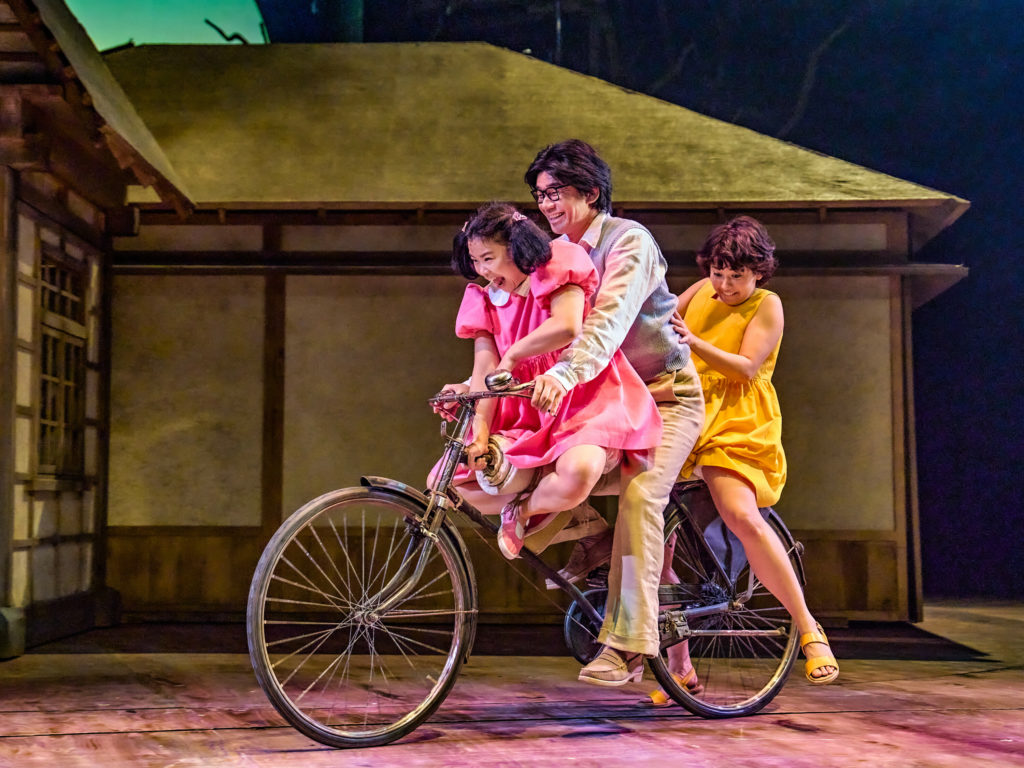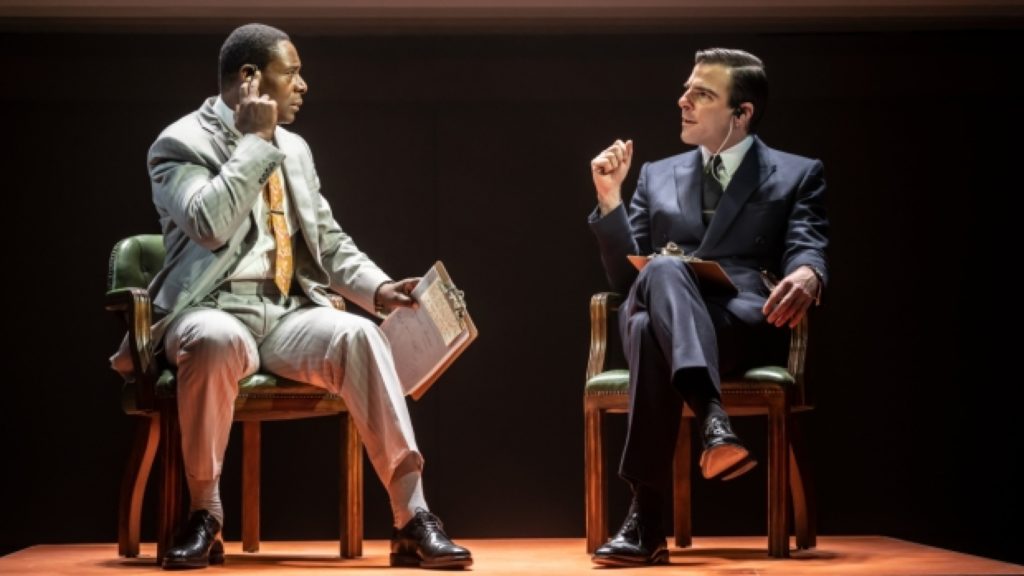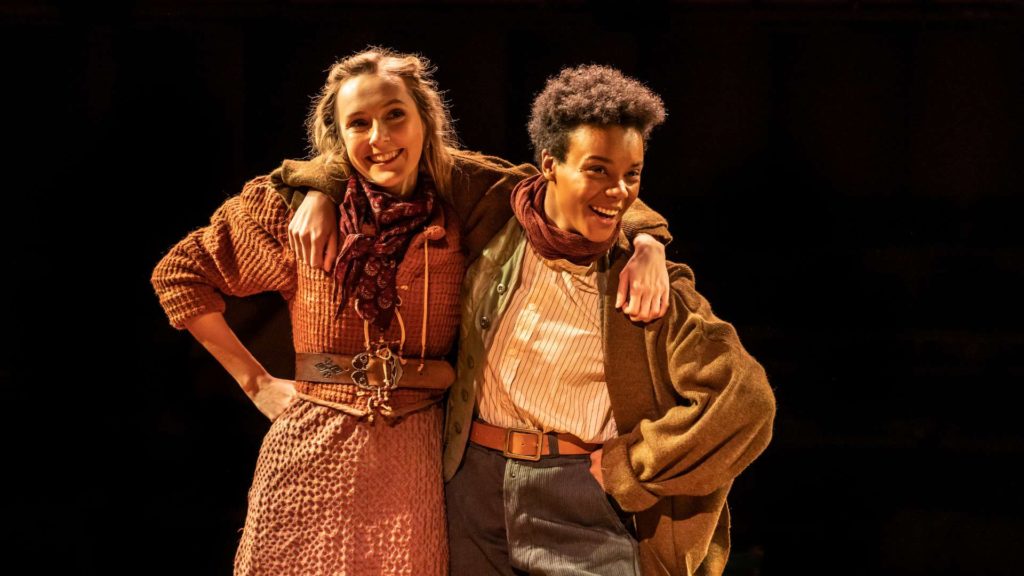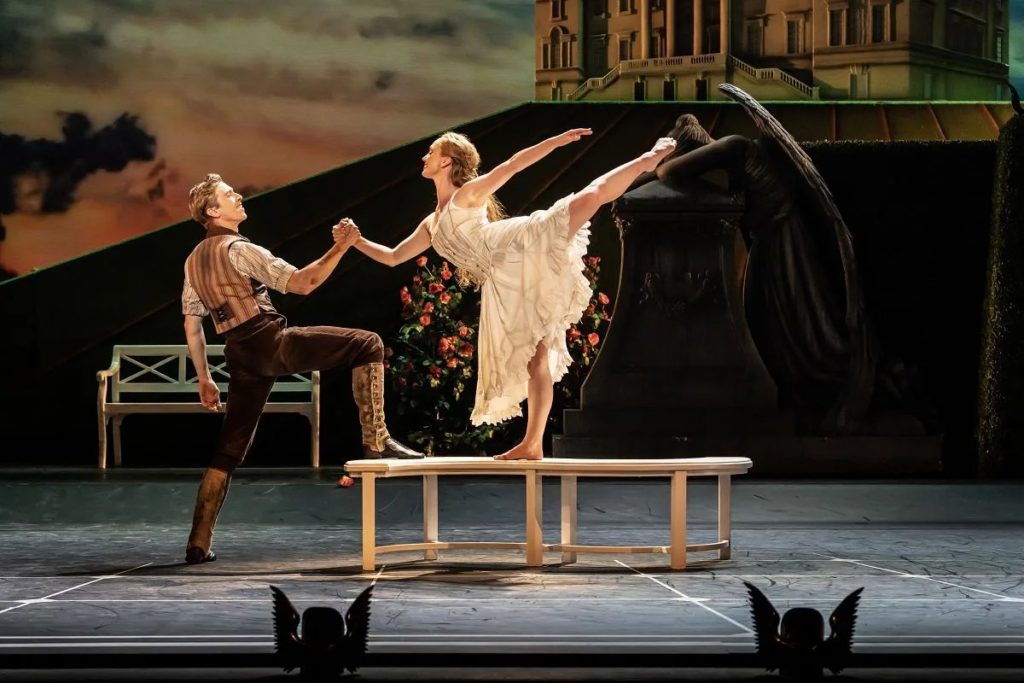VIEWPOINTS – LONDON THEATER RECAP: An overview of new family fare, high dramas, some requisite Shakespeare, and twists on ballet classics
- By drediman
- January 14, 2023
- No Comments
VIEWPOINTS – LONDON THEATER RECAP: An overview of new family fare, high dramas, some requisite Shakespeare, and twists on ballet classics
Over the holiday season, I got the opportunity to indulge and catch up with theater and a little bit of dance across the pond. Here is a comprehensive recap of my experience, which encompasses London’s current crop of new family fare, high dramas, some requisite Shakespeare, and a couple of dance works. In short, I’m happy to report that the performing arts in London theater is alive and well, providing a well balanced slate of theatrical offerings that satisfied the different facets of my appetite for theatrical performances.
New Family fare from the Royal Shakespeare Company and the National Theatre: My Neighbor Totoro and Hex

The Royal Shakespeare Company and the National Theatre are arguably two of the UK’s most recognizable theatrical institutions, having presented a number of iconic stage productions over the years. This holiday season, these two big guns are respectively presenting a big-budgeted family-friendly offerings. Here are my thoughts on them.
- Over at the Barbican Centre, you’ll find the RSC’s sold out production of My Neighbor Totoro (HIGHLY RECOMMENDED), the highly hyped stage production of Hayao Miyazaki’s beloved animated film of the same name for the legendary Studio Ghibli. Directed with heart and epic scale by Phelim McDermott — who has made a name for himself stateside for directing some notable productions at the Metropolitan Opera — the production retains the charm and quirkiness of Miyazaki’s beloved film, thanks chiefly to the the convincingly youthful performances by Mei Mac and Ami Okumura Jones as two siblings learning the tough realities of life, as well as some awe-inspiring puppetry (courtesy of genius puppeteer Basil Twist).
- Then at the National Theatre, we have the new family friendly musical Hex (SOMEWHAT RECOMMENDED). Where to start with this one? Based on the Sleepy Beauty fairytale, the musical tells the well-known story from the perspective of the tale’s evil sorceress. With a book by Tanya Ronder, music by Jim Fortune, and lyrics by Rufus Norris (the original concept is by Katrina Lindsay and Mr. Norris), the work calls to mind an uneasy mix of Wicked, Shrek, and Sweeney Todd. Despite some beguiling performances (particularly from Lisa Lambe and Victoria Hamilton-Barritt as Fairy and Queenie, respectively) and some fascinating design work, Hex ultimately falls short of its considerable ambitions. Norris, who also directs the piece, does his best to streamline the disjoined and incongruous work.
High dramas in the West End: Best of Enemies, Orlando, and Good

Then we have the high minded dramas, which London theater tends to excel in. On this trip, I took in a trio of thoughtfully crafted productions in the West End — two new works and the third a hard reconsideration of an existing play — that provoked me as worthwhile theater should.
- Currently at the Noël Coward Theatre, you’ll be able to catch James Graham’s Best of Enemies (RECOMMENDED), a new play chronicling — via the televised sessions between conservative Willam F. Buckley and liberal Gore Vidal leading up to the turbulent 1968 presidential elections — the rise of political debate as we know it today. Cinematically directed by Jeremy Herrin, the work, which was first seen at the Young Vic, is a potent companion piece to the playwright’s Ink, another play that explores the role of and tracks the development of media in modern day society. David Harewood and Zachary Quinto breathe vital life into Buckley and Vidal, respectively, imbuing them with magnetism and larger-than-life grandiosity.
- Then at the Garrick Theatre, you’ll find Orlando (RECOMMENDED), a new play based on the 1928 novel of the same name by Virginia Woolf. Adapted by Neil Bartlett, the play tells the fantastical story of the titular Orlando, a nobleman who seeks to pin down his identity and find love over the course of centuries of European history. In many ways, Woolf was ahead of her time when she penned this audacious investigation of gender (Orlando toggles between man and woman over the decades) and desire. Directed by Michael Grandage for his own theater company — the aptly named Michael Grandage Company — the production capitalizes on the underlying material’s prescient qualities. By casting the irrepressible non-binary actress Emma Corrin (who played Diana in the popular television series The Crown) in the title role and the the vivacious Deborah Findlay as her maid, the play registers very much of the moment.
- In the nick of time, I was able to catch a performance of the revival of C.P. Taylor’s Good (HIGHLY RECOMMENDED) during the final week of its extendedr un at the Harold Pinter Theatre. British superstar David Tennant (of Dr. Who fame) returns to the London stage together with Elliot Levey and Sharon Small in this potent and timely reimagining of C.P. Taylor’s acclaimed play about an essentially “good” man who is sucked into the inner workings of the Nazi party during World War II. The play is directed by Olivier Award-winner Dominic Cooke, who gives the production a chamber opera like quality which rarely lets the intensity subside. The innately charismatic Mr. Tennant once again proves his worth as a stage actor, giving a clear-eyed performance that’s simultaneously immensely likable and chillingly calculated. His co-stars aren’t slouches either; Mr. Levey and Mr. Small morph between the play’s numerous characters with effortless skill.
Requisite Shakespeare: As You Like It and Othello

Any trip to London wouldn’t be complete without attending at least one play by the Bard. I caught two of them during the trip.
- I can’t think of a better way to christen the puzzlingly named @sohoplace — the West End’s first newly built theatre in 50 years (and its only in-the-round auditorium — than with its inaugural tenant, Josie Rourke’s superb production of As You Like It (HIGHLY RECOMMENDED). The musically-oriented production is an utter breath of fresh air. Indeed, Ms. Rourke and her top-notch cast gently allows Shakespeare’s language to simply and organically emerge from the play rather than forcing it upon the audience. As a result, the play’s pastoral and autumnal qualities have rarely felt more naturally wrought, which is enhanced and made more immediate by the venue’s intimate design. The diverse casting (e.g., Celia is largely played in sign language by the enchanting Rose Ayling Ellis) is anything but agenda-driven, beautifully jiving with the inclusivity that is the calling card of the Shakespeare’s Forest of Arden.
- Then across the Thames back at the National Theatre, I had the opportunity to take in a powerful staging of Othello (RECOMMENDED), the first major London production of the play helmed by a Black man. Director Clint Dyer (best known for helming well-received productions like Death of England: Parts 1, 2 and 3 and Get Up Stand Up! The Bob Marley Musical) imbues his powerful new staging with the thoroughness of a medical examination. Indeed, in his take, nothing in Shakespeare’s text is taken for granted, which gives the stylish production great force and heft. Thankfully, the excellent cast — which includes Giles Terera as a psychologically tortured Othello, Rosy McEwen as a particularly strong-willed Desdemona, and Paul Hilton as an ideally slippery Iago — is able to withstand the director’s scrutiny, delivering performances that have stayed with me.

Twists on ballet classics: Matthew Bourne’s Sleeping Beauty and Paris Opera Ballet’s Swan Lake
During my time across the pond, I also had the opportunity to catch the return of two fascinating interpretations of ballet classics.
- Hex wasn’t the only radical interpretation of Sleeping Beauty I came across during my trip to London. Over at Sadler’s Wells, Matthew Bourne’s gothic, out-of-the-box version of Sleeping Beauty (HIGHLY RECOMMENDED) has returned to the capital at the venue where the production premiered a decade ago. Thankfully, the visually striking production (kudos to designer Lez Brotherston, a longtime collaborator of Bourne’s) has aged rather well and and continues to cast its seductive spell. The main alteration is the incorporation of vampires (!), which deftly explains many of the tale’s fuzzy details. In equal measure pulpy and romantic, Bourne’s take fleshes out the narrative and does away with the extended wedding scene of the classical ballet. At the performance I attended, the lovely Ashley Shaw (in the title role) led the game company, who performed Bourne’s grounded choreography with finesse and a good dose of tongue-in-cheekness.
- During my short jaunt across the English Channel to visit the City of Light, I paid a visit to the Opéra Bastille to attend the season’s final performance of Paris Opera Ballet’s Swan Lake (SOMEWHAT RECOMMENDED). Choreographed by the great Rudolf Nureyev for the beloved company in 1984, Paris Opera Ballet’s version of the popular ballet plays out more like psychological study of a man — in this case the Prince Siegfried — whose search for a romantic love and dissection of desire remains only in his mind. As such, much of the ballet’s proceedings seem to play out in what seems to be the prince’s imagination. Perhaps no other ballet company is as elegant as Paris Opera Ballet, which is evident in the dancers’ uniformly pristine lines, gracefully-placed upper bodies, and ethereal demeanor. What’s missing from the whole affair is tension, which is particularly evident in a story as dramatic as Swan Lake’s. As much as I admired the dancing (Amandine Albisson as Odette/Odile, Jérémy-Loup Quer as Prince Siegfried, and Thomas Docquir as Rothbart), this version remained stubbornly flaccid.

 Copyright © 2025
Copyright © 2025
Leave a Reply